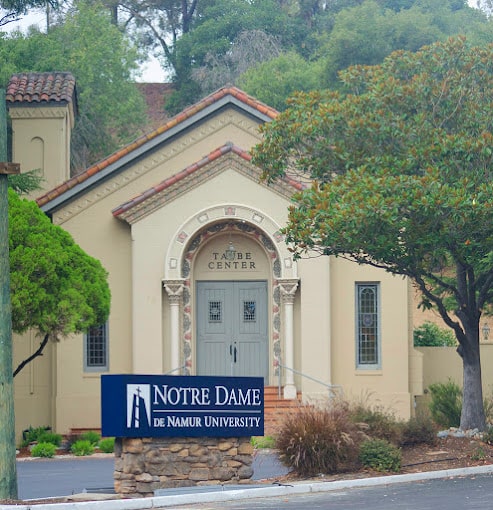
What is a Degree Completion Program? – Notre Dame de Namur University
By Rich Stamos
October 13th, 2023
Read Time Estimate: 3 minutes
In the United States, obtaining a college degree is the dream of many. A college degree is also necessary in many cases for career advancement. However, the Education Data Initiative shows that around 32.9% of undergraduates do not achieve degree completion.
The reasons for not finishing a Bachelor’s program are unique to each individual. Some common causes may include other time commitments, financial issues, starting a family, or taking care of a loved one.
If you’ve never finished your degree but have always wanted to, a degree completion program can help you complete your degree. Keep reading below to learn more.
What Is a Degree Completion Program?
A degree completion program is a service offered by numerous 4-year universities and colleges. It helps students complete their unfinished degrees. A degree completion program is primarily offered to those who wish to complete a Bachelor’s Degree.
Colleges understand that not everyone has the time or the financial resources available to commit to a 4-year degree program. When students don’t complete their degree programs, oftentimes they will still have their college credits on file.
Rather than letting these accumulated college credits go to waste, they can be used for degree completion instead. These credits may still be on record at a student’s previous school. In some cases, they can even be transferred over to a new school of the student’s choosing.
Utilizing these existing college credits allows many students to pick up where they left off. Some students may be closer to meeting the graduation requirements, so a degree completion can take less time than they think.
Students who have already achieved an Associate’s Degree have a distinct benefit. They can take part in specific degree completion programs to receive their Bachelor’s Degree.
Who Is a Good Candidate for Degree Completion?
Many students may have experienced unforeseen circumstances which prevented them from degree completion. If you’re one of these students, you may think it’s pointless to go back now.
However, it’s not too late to complete your degree. Let’s take a look at some of these potential candidates here.
Service Members
Service members, both active and retired, receive educational benefits. Often students earn college credits before joining the service and don’t think to re-enroll after their service commitment is through. They may also begin their education in the service but decide not to pursue further education once they leave the service.
A service member can use their previous educational progress towards their degree completion. Some degree completion programs may even count their professional service experience towards their degree completion and career development.

Older Adult Learners
It was once thought that college life was primarily aimed at the 18 to 24-year-old age group, but this isn’t true anymore. Many adults are seeking out degree completion later in life. According to Pew Research and Census Bureau data, 37.9% of adults aged 25 and older currently hold a Bachelor’s Degree.
Between working and taking care of a family, older individuals may not have time to pursue a traditional degree program. This makes a degree completion program even more ideal. If a degree is required for proper career advancement, it is possible to use a degree completion program to achieve this goal of continuing education.
Adult learners looking to complete their degrees can now take advantage of night and weekend learning classes. They can also study remotely online. This allows them to accomplish their degree completion in a way that works for their needs and schedule.
Associate Degree Holders
An Associate of Arts Degree requires roughly 60 semester credits or 20 classes and is generally completed within 2 years. A Bachelor of Arts or Sciences degree requires double this commitment with 120 semester credits or 40 classes over a 4-year span. An Associate’s Degree is desirable to some because of its less demanding time commitment.
If you have a completed Associate’s Degree already, you may be able to transfer to a Bachelor’s Degree completion program without needing to make a full 4-year commitment. There are also scholarships available to make it happen even more affordably.
Transfer Students
Transfer students may also be able to take advantage of degree completion as well. Some students also choose to start the education process at a community college because it is much more affordable than a 4-year university.
International Transfer Students may also be able to apply to a degree completion program in the United States. The requirements involved will vary based on the number of credits and university policies.
A community college also gives students the opportunity to get their general education requirements out of the way before they switch gears to a more specialized field of study.
Look into programs that allow you to transfer your credits between educational institutions like 2-year community colleges to 4-year universities. This allows for faster degree completion.
How Can You Enroll in a Degree Completion Program?
The next step will take some work on your part to follow through. If you believe you are a good candidate for degree completion, then make sure to follow these steps to continue the process.
Research Potential Degree Completion Programs
While there are many programs available for degree completion, it is important to find the best fit for your needs. Some of the most popular fields of study are:
- Business and Management
- Education
- Psychology
- Nursing and Healthcare
- Engineering and Technology
You should set your sights on which degree program you are most interested in pursuing. Once you’ve done that, research the programs that can help you get there. You should also verify that the program you select works within your schedule.
For example, if you choose to attain a Bachelor of Arts in Psychology, make sure your program allows you the flexibility you need. Some programs offer online-only, night, weekend, or hybrid class setups for busy working adults. You can even attend classes at a different campus while still being awarded your desired degree from the institution you want.
Evaluate Your Current Credits
Evaluating your credits is a crucial next step. You will need to see what credits you have completed and which credits you will still need for degree completion. Depending on how many previous credits you have on record, you may be able to complete your degree in 2 years or less.
Credits must be from an accredited school. Some degree completion programs may not accept certain credits from certain schools.
You will need to reach out to the Registrar’s office at your previous school to request an official transcript. Verify that you have the proper number of minimum earned academic credits before you apply for your degree completion program of choice.
If a long time has passed between your previous credit earnings, they may not apply to your current program. You will also need to see which programs will allow you to utilize your credits to the fullest. This ensures your hard-earned previous credits won’t go to waste in the process.

Research by the Government Accountability Office shows that 43% of college credits don’t apply to obtaining a new degree. While another 30% of credits were lost transferring from a two-year to a four-year university.
Obtaining an Associate’s Degree is the most preferable method. It ensures a smoother transition of your college credits into a degree completion program. You may still lose some credits in the process if you don’t already have an established Associate’s Degree, but this is to be expected.
In some circumstances, previous work experience may also count toward college credits. These are sometimes referred to as prior working credits and take your current working skills and history into account for particular degree completion programs. Not every program will accept these types of credits though, so it is vital to shop around for the right program that will.
Fill Out Program Applications
When you’ve selected the right degree completion programs, it’s time to start filling out your applications. You can even fill out many of these details through online applications.
Although it may seem daunting, degree completion program applications are actually very straightforward. You will need to have information such as:
- The name of the college where you obtained your Associate’s Degree
- Citizenship Status
- Your Unofficial Transcript
- Contact information
- Birthdate
You can also apply for financial aid during your application. A trained counselor will reach out to you if they require any further information. These counselors are here for you to guide you through the process and answer any questions or concerns you may have.
Going back to school can be a difficult decision for some. If you’re unsure, reach out for counseling and academic support. Universities with a degree completion program often have advisors who specialize in this area for a reason.
Complete Your Degree in Business or Psychology at NDNU
Having your degree is not only essential for career advancement, but also for peace of mind. Having a degree gives you that special sense of accomplishment. Even if you had to put your dreams of degree completion on hold, there’s still a way to make that dream come true.
Notre Dame de Namur University’s degree completion program can put you back on the path to obtaining your BS in Business Administration, which is a 2-year on-line evening program for students with an Associate in Science for Transfer in Business Administration.
If you earned an Associate in Art for Transfer (AA-T) in Psychology, NDNU has partnered with the San Mateo County Community College District to help you earn your bachelor’s degree, whether you graduated, or will graduate from Cañada College, College of San Mateo, or Skyline College. You will be an NDNU student and will earn an NDNU diploma. But conveniently, we offer all in-person classes at the Cañada College campus. Taking upper-division classes with a cohort of your peers, you can complete your BA in Psychology in two years.
If you’re ready to start the process of degree completion, then contact our Admissions Department to request more information today.

Interested in earning a master's degree? Fill out this form and we'll be in touch with more information!
More From NDNU

Master of Science vs. Master of Arts
Read Time Estimate: 4 minutes December 21st, 2023 A master’s degree is a higher education degree that you can pursue after graduating with your bachelor’s.

What is an MBA degree worth?
Read Time Estimate: 4 minutes July 19th, 2023 The pursuit of a Master of Business Administration (MBA) has long been considered a gateway to success

Is a Bachelor’s Degree Worth It? – Notre Dame de Namur University
Read Time Estimate: 3 minutes November 5th, 2023 In today’s fast-paced world, you may question the worth of getting a bachelor’s degree. People have emphasized
